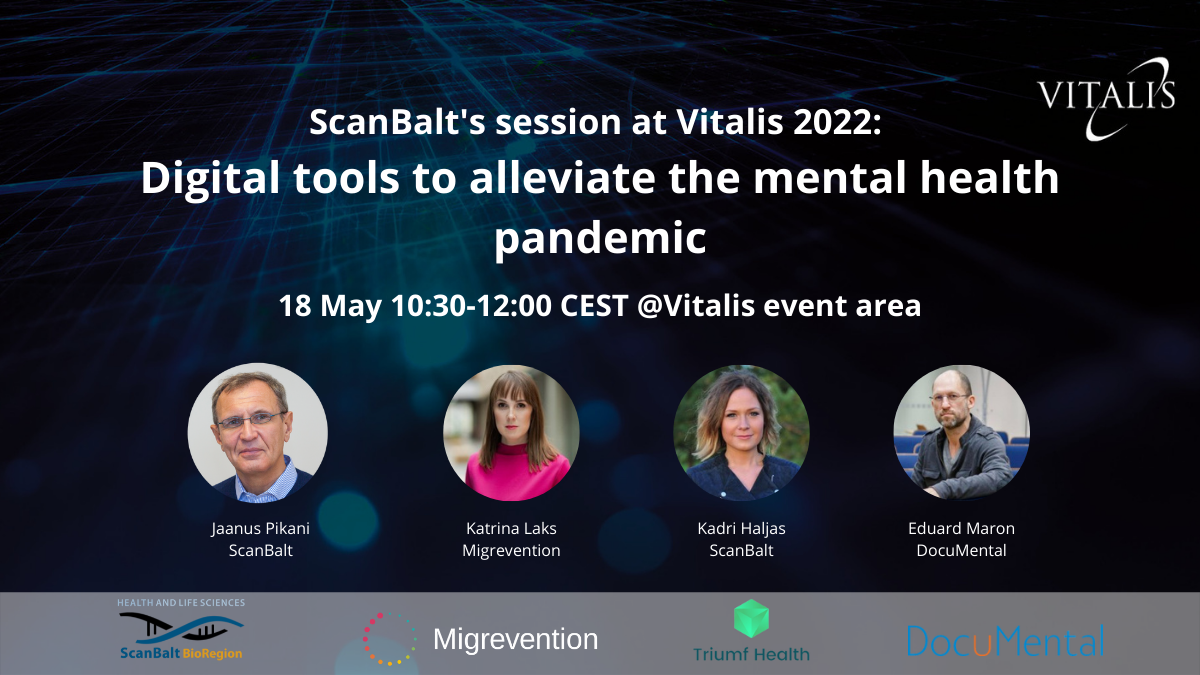
ScanBalt Session on digital tools to alleviate the mental health pandemic Passed
Wednesday May 18, 2022 10:30 - 12:00 Event Area

The problem
38% of EU citizens are affected by mental disorders yearly, and 50% will have at least one disorder during life (PMID: 21896369). In the EU, the public costs of mental health disorders are estimated at €798 billion (to be double by 2030), which have already surpassed other diseases, such as cancer or diabetes. Mental health accounts for 39.7% of years lived with disabilities and 44% of all work-related illnesses in 2019 (hse.gov.uk).
300.000 patients wait months for mental health services with > 6 weeks gaps between visits (source BBC). The information necessary for patient care is not available when needed, at least in 50% of cases (PMID: 24901184) and 38.2% of overtreatment is due to difficulty accessing medical records (PMID: 28877170). 70% of patients with mood disorders are initially misdiagnosed on average for 5.0–7.5 years (PMID: 15541064).
Health care professionals must manage patient assessment and caseload within short consultations (45 min - first contact; 15 min - follow-ups). This time pressure leads to gaps in the care plan, data quality, and team-patient communication.
Agenda
- Introduction by the moderator - Dr Jaanus Pikani, Chairman, ScanBalt (5 min)
- Comprehensive, evidence-based digital support diagnostic system DocuMental (25 min)
Speaker: Prof Eduard Maron, founder of DocuMental Ltd (https://documental.ee), Honorary Lecturer in Division of Neurosciences and Mental Health, Imperial College London.
Dr Eduard Maron is DocuMental’s Founder and Chief Executive Officer. He is also a Professor of Psychopharmacology at the University of Tartu, Visiting Professor at the Faculty of Medicine, Imperial College London and a member of the Scientific Advisory Board of the Estonian Genome Centre. His clinical experience in psychiatry spans 16 years, 5 of which were spent as a Consultant for the admissions ward at Hammersmith and Fulham Mental Health Unit, on the Charing Cross Hospital site in West London Mental Health NHS Trust.
- Setting a global example in developing technology to improve mental health in a scalable way (25 min)
Speaker: Dr Kadri Haljas, founder and CEO of Triumf Health (https://www.triumf.health).
Triumf Health has developed an evidence-based digital therapeutics platform for children to deliver personalised psychological support through a game environment. Dr Haljas has a background in health psychology. In addition to her clinical experience, she holds a PhD degree from the University of Helsinki, Faculty of Medicine. Dr Haljas has been a long-term advocate of the importance of implementing mental health innovations in Estonia and globally. She is also the founder of the Mental Health Innovation Hub, a global centre for excellence headquartered in Estonia.
- Digital technology-based interventions for the treatment of migraine (25 min)
Speaker: Katrina Laks, CEO of Migrevention (https://migrevention.com).
Katrina is a health founder with 15-year long migraine experience, and has a mission to improve the life quality of fellow patients. In 2020 she founded Migrevention, a digital headache clinic, together with top medical experts from Estonia. Now she grows her knowledge and pain to others' benefit by making evidence-based migraine treatment accessible for everyone and everywhere.
Katrina has a scientific background from Tallinn University of Technology and is also one of the founding members of the patient organisation Estonian Migraine and Headache Patients Association.
- Discussion/Q&A (10 min)
Language
English
Topic
Beslutsstöd
Seminar type
Live
Objective of lecture
Verktyg för implementering
Level of knowledge
Introduktion
Target audience
Chef/Beslutsfattare
Politiker
Upphandlare/inköp/ekonomi/HR
Tekniker/IT/Utvecklare
Forskare (även studerande)
Studerande
Omsorgspersonal
Vårdpersonal
Patientorganisationer/Brukarorganisationer
Keyword
Exempel från verkligheten (goda/dåliga)
Nytta/effekt
Välfärdsutveckling
Personcentrering
Innovativ/forskning
Dokumentation
Appar
Patientsäkerhet
Användbarhet